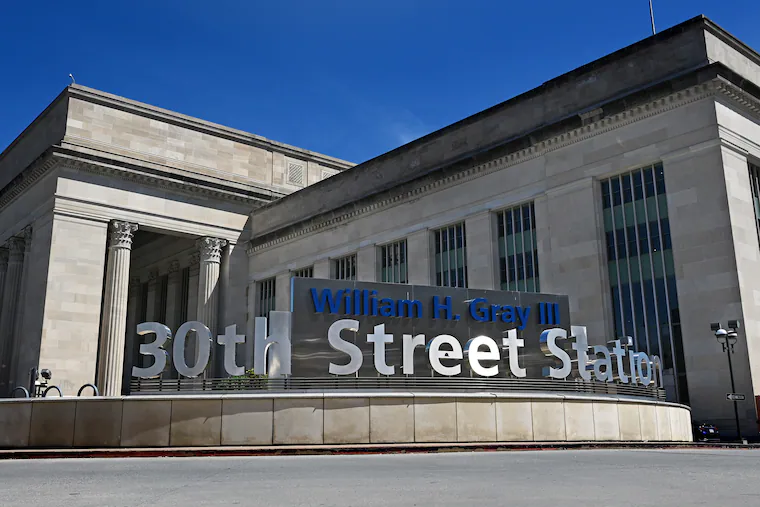
The owner of an Illinois-based masonry company was sentenced Wednesday to 7½ years in prison for participating in what federal prosecutors called an “extraordinarily brash” bribery scheme that helped inflate the cost of a $100 million renovation project at 30th Street Station.
Mark Snedden and employees at his firm, Mark 1 Restoration, provided a series of extravagant gifts to the Amtrak manager overseeing the project from 2016 to 2019 — including paid vacations to India and Ecuador, a Tourneau watch, expensive meals, and a German shepherd puppy, along with dog-training classes.
In exchange, the project manager, Ajith Bhaskaran, helped secure tens of millions of dollars in additional government-funded work for Mark 1. And although federal authorities do not dispute that the company performed legitimate duties on the project, they said most of the gifts provided to Bhaskaran — which were prohibited under Amtrak rules — were also effectively subsidized by the government because Mark 1 had falsely inflated its invoices to cover the costs.
Snedden, 70, of Munster, Ind., had pleaded guilty earlier this year to charges of conspiracy to commit bribery and making a false claim — making him the sixth person involved in the conspiracy to admit to crimes as part of the scheme.
Four of those charged were from Mark 1, while two others worked for a second company that also lavished Bhaskaran with similarly pricey gifts.
Bhaskaran, meanwhile, had been charged with unrelated wire fraud, but died of heart failure in 2019.
In court Wednesday, Snedden said he was “deeply sorry” for his actions in the case.
“I failed the people that placed their trust in me,” he said.
U.S. District Judge Wendy Beetlestone said she believed Snedden’s behavior was an aberration for someone whose friends and family members described in letters as generous, caring and thoughtful.
Still, Beetlestone said, Snedden’s crimes were serious and deserved to be punished.
“Bribes have consequences,” she said.
The 30th Street renovation project was announced in 2015, when Amtrak signed a $58 million contract with Mark 1 to repair and clean the station’s limestone facade.
Bhaskaran oversaw the project and effectively controlled its purse strings. Court documents said that Mark 1 executives quickly came to realize their conditions on the job site — and their potential for new business on it — could be helped if Bhaskaran was happy.
About a year into the project, executives at Mark 1 began fulfilling what they said were Bhaskaran’s requests for gifts, providing thousands of dollars’ worth of food, entertainment, and other lavish expenditures: dinners at steakhouses, a $5,600 watch, the paid vacations, and a nearly $5,000 check to an Illinois breeder of German shepherds.
Over that same timeframe, Mark 1 continued to receive additional funding for its work at 30th Street. In total, prosecutors said, Bhaskaran helped secure the company $52 million in new business, about $2 million of which was considered overbilling to help cover the firm’s graft.
Snedden’s attorneys said he was not intimately familiar with the particulars of the bribery conspiracy — he had never met Bhaskaran, they said, and he let his subordinates run the day-to-day operations of the job.
But prosecutors said it was “difficult to fathom” how the conspiracy could’ve unfolded without him as head of the firm. They also said Snedden’s bonus structure made him the person with the most to gain financially from securing additional contracts.
And in court, Assistant U.S. Attorney Jason Grenell said that Snedden at one point was asked to approve a $4,755 check for Bhaskaran’s new puppy. When Snedden emailed an associate to ask what the money was for, he received a one-word reply.
“Dog,” the email said. Snedden then approved the expense.
The scheme began to fall apart in 2018, when an anonymous tipster sent a letter to Amtrak’s inspector general about Bhaskaran’s suspicious behavior around the job site. That led to an investigation involving the FBI, Amtrak’s inspector general, and other federal agencies.
Snedden went on to cooperate, and his attorneys said he provided information that proved crucial to authorities’ understanding of the scale of the crimes.
Grenell, however, said Snedden’s mistakes were not impulsive onetime errors — he was an experienced construction executive who knew better, but he did nothing to stop the crimes until it was too late.
“He made a decision,” Grenell said. “He chose money.”
And Beetlestone, the judge, said that course of conduct is part of what merited a significant penalty.
“He had every reason not to go along,” she said, “and every reason to stop this situation before it deepened.”



